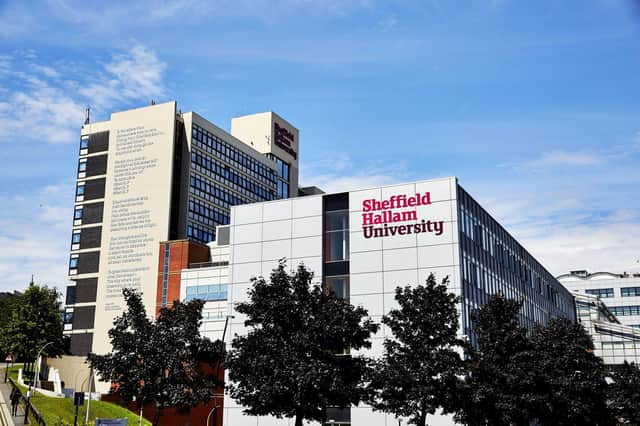The week that was: Sheffield Hallam’s response to the coronavirus


It is a community of 37,000 students and staff, drawn from more than 100 countries around the world but strongly anchored in its three operating campuses across Sheffield – Collegiate Crescent, in the Olympic Legacy Park research centres, and, of course, in its main campus, across Sheffield city centre. Every day, its work depends on interactions between staff and students, in lecture and seminar rooms, in laboratories and workshops, in gallery spaces and computing rooms.
As coronavirus spread across the nation – and indeed the globe – it was clear we needed to take exceptional measures in the university. Our over-arching mission is to offer outstanding teaching and learning, but we were faced with the challenge of not being able to operate a campus university.
Advertisement
Hide AdAdvertisement
Hide AdWe took a decision to transition our teaching, wherever possible, from face-to-face to remote and online, while trying to maintain the full range of support services on which our teaching depends. That list includes student support and welfare services, library and information technology services, technical support in laboratories and workshops, day-to-day delivery of catering and domestic and security services.
We mobilised a core team of leaders and launched an enormous change programme. Like all universities, we are highly technologically-enabled. We start from a position of strength, with a robust IT network and strong applications for virtual learning.
However, our staff and students depend on face-to-face contact. We began to map out how we could replicate the things which make our university special: attention and care for individuals, strong team ethos, working in groups. This was all difficult enough in itself – a huge logistic, planning and communications challenge. But of course, we were doing this while the national picture was changing.
We were in a senior team meeting at precisely the moment when the Prime Minister made his announcement asking people to work from home.
Advertisement
Hide AdAdvertisement
Hide AdOn most days, our planning was frenetic as we tried to keep up with national changes, the understandable anxieties and questions coming from our students, and the need to provide information and support to our staff – all of them increasingly working from home.
Much of our research, of course, depends on advanced technology and specialist equipment, and cannot be undertaken from home. Universities like Sheffield Hallam are asking hard questions about how we run our research facilities in these remarkable circumstances.
All of this is transforming the university in ways which, two weeks ago, we’d have thought were unimaginable.
And we were doing this at the same time as every other of the city’s employers – all trying to understand how we can continue to operate, to deliver outstanding service to those who depend on us, and how we might continue to best serve our region in this challenging time
Advertisement
Hide AdAdvertisement
Hide AdAs I write this, there are answers I still do not have about the next few weeks and undoubtedly the pandemic situation will continue to evolve in significant ways. Whatever happens, I’ve been enormously impressed by the Hallam team, who have responded to a quite unexpected challenge with imagination and determination, with many working incredibly long hours and adapting quickly to meet the demands of students, our research collaborators, and broader partners.
Our response to Coronavirus will almost certainly pose profound longer-term questions for all of us about the way our organisations work. This could be a definitive moment of transition to home-working – with all the challenges that will pose. It could change the way we interact with each other for many years to come.
I don’t know the answers to those questions. What I know, and what has been a powerful driver for the decisions I and my senior teams have made this week, is that Sheffield Hallam – a university which trains more new NHS professionals than any other in England each year – is a vital resource in the city and the region.
This crisis only reinforces our commitment to our region and is encouraging us to think differently about how we can best serve our local community in this time of unprecedented need.
Our campuses may be rather quieter for a while, but we are there, and still delivering for Sheffield and the region.